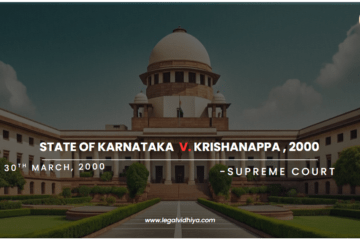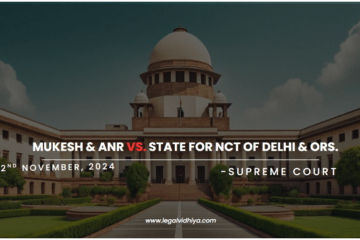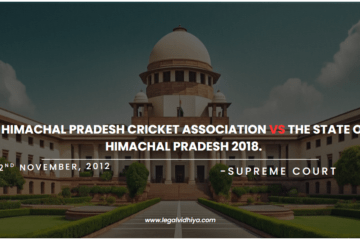
Canara Bank Thrissur vs R. S. Vasan, 2014 SCC Online NCDRC 337: MANU/CF/0540/2014
| REVISION PETITION NO. | 914 of 2014 |
| DATE OF JUDGEMENT | 03 September, 2014 |
| COURT | National Consumer Disputes Redressal Commission, New Delhi |
| APPELLANT | Canara Bank, Thrissur |
| RESPONDENT | R. S. Vasan |
| BENCH | Mr. J. M. Malik, Mr. Dr. S.M. Kantikar |
INTRODUCTION-
In Case ‘Canara Bank Thrissur vs R. S. Vasan, 2014’, it is embedded that one has to take complete responsibility for his own actions. The complainant/respondent here did his signatures on blank papers which ultimately burdens him with the liability as a surety. He now cannot claim that he wasn’t aware of the same.
The central idea of this case mainly revolves around the point that negligent actions cannot be excused and to get your rights established, you have to fulfil duties on your part.
Present case also highlights that there is no such rule or obligation on the bank to execute against the borrower first. It is their free will against whom to take action first borrower or surety. This judgement surely influences the upcoming similar proceedings and provides for certain legal principles.
All the material points about this are discussed herein under.
FACTS OF THE CASE-
- 22.06.1996- The respondent (R. S. Vasan) introduced Mr. C. K. Prabhakaran to the appellant (Canara Bank).
- The bank provided an overdraft facility of Rs. 1,00,000/- to Mr. Prabhakaran against some immovable property to the extent of 12 1⁄2 cents.
- That property was owned by the wife of Mr. Prabhakaran i.e., Shri Vilasini in Kainoor Village.
- Mr. Vasan had no intention to become guarantor of aforesaid overdraft.
- Mr. Vasan had his term deposit in the said bank.
- And. Mr. Vasan was made to sign some blank papers.
- 07.06.2001- Mr. Prabhakaran died.
- 22.06.2003- Canara Bank informed Mr. Vasan via letter that the overdraft facility provided to Mr. Prabhakaran on his security i.e., sum of Rs. 1,36,135.50/- is to be adjusted from his term deposit.
- Mr. Vasan instantly denied his liability.
- 26.11.2003- Canara Bank via another letter informed Mr. Vasan that the amount is Rs. 1,45,799.30/-.
- Canara Bank adjusted Rs. 1,45,799.30/- from the term deposit of Mr. Vasan.
- Both the District Forum and the State Commission directed the Canara Bank to pay a sum of Rs. 1,48,698/- with 12% interest per annum from 02.01.2004 till realisation and Rs. 1,000/- as costs within 2 months from the date of a copy of that order.
With costs of Rs. 5000/-, State Commission dismissed the appeal.
- So, this revision petition is presented before the bench.
ISSUES RAISED-
- Whether respondent is the guarantor/ surety for loan/overdraft taken by Mr. Prabhakaran.
- Whether the bank has the authority to adjust the amount from the existing term deposit.
CONTENTIONS OF THE PETITIONER-
- That there is no such concept as of obtaining bond from the guarantor, otherwise the basic idea of mortgage by title deed would be demolished.
- That the respondent’s signatures are present on the papers which states that he is the surety for the deceased (i.e., Mr. Prabhakaran).
- As per the general phenomenon, it is the choice of the bank from whom it wants to recover the money, either from loanee or from surety. There’s no such rule that Bank has to take action firstly against the loanee then from guarantor.
CONTENTIONS OF THE RESPONDENT-
- That the bank is doing fraud and is trying to recover money fraudulently.
- That the bank should have taken action against Mr. Prabhakaran and his representatives first.
- That the respondent is entitled to receive Rs. 2,19,889/- from the bank.
- That if the respondent was deemed as a guarantor for deceased then the bank should have obtained a bond from the respondent.
- That prior decisions were both in favor of the respondent and there is no illegality or inconsistency in those two.
JUDGEMENT-
The fact that the respondent signed the blank papers with his own consent and there the respondent didn’t prove that those signatures were taken fraudulently or by coercion and bank cannot be made bound to take action against borrower first makes the circumstances clear. Some cases which clarify that the burden is on the complainant to prove fraud or coercion when papers were signed are Mrs. Margret Lalita Samuel vs Indo Commercial Bank, Syndicate Bank vs Vijay Kumar, Kuldeep Singh vs Nanak Singh etc.
And the commission after considering the above reasons, sets aside the prior orders passed in this case and dismisses the complaint without any costs.
This revision petition stands disposed of accordingly and that there shall be no order of costs too.
ANALYSIS-
- Surety/guarantor– The person on whom the liability rests for paying back in case of any default on part of the actual borrower or loanee. The surety cannot step back from his liability by saying that actions should be taken against the borrower.
- Settlement-the core of the case is about whether the bank can adjust the pending payment from the existing term deposits of the surety with the bank.
- Free consent– it implies that whether there was free will and the act was done without any fraud, coercion or misrepresentation. Like in the present case, the respondent had signed the papers with his own volition and without any pressure and there was no sign of fraud or coercion, this signifies free consent on his part. If the situation had been contrary, defense of consent not being free could be taken.
CONCLUSION-
The present case establishes a crucial legal precedent in loan/surety’s liability decision matters. It clarifies the rights and duties of both the parties and establishes that none of the parties can misuse and misinterpret the implied terms. If any one of them tries to do so, legal recourse is available for them.
When the bank gave notices and in case of no responses, adjusted the amount from the respondent’s term deposit, the latter appealed to the respective Forum which accepted the demand of the latter.
Being aggrieved, the matter came in front of the above panel, and as stated already, the decision was reversed and the petition was disposed of without costs.
So, in brief, this is the assurance which maintains the dignity of justice and jurisdiction. It’s not always that the customer can benefit from its vulnerable position and acquire what he doesn’t deserve.
REFERENCES-
- www.casemine.com
- www.the-laws.com
This Article is written by Devanshi Goyal, student of Faculty of law, JNVU, Jodhpur; Intern at Legal Vidhiya.
Disclaimer: The materials provided herein are intended solely for informational purposes. Accessing or using the site or the materials does not establish an attorney-client relationship. The information presented on this site is not to be construed as legal or professional advice, and it should not be relied upon for such purposes or used as a substitute for advice from a licensed attorney in your state. Additionally, the viewpoint presented by the author is of a personal nature.




0 Comments